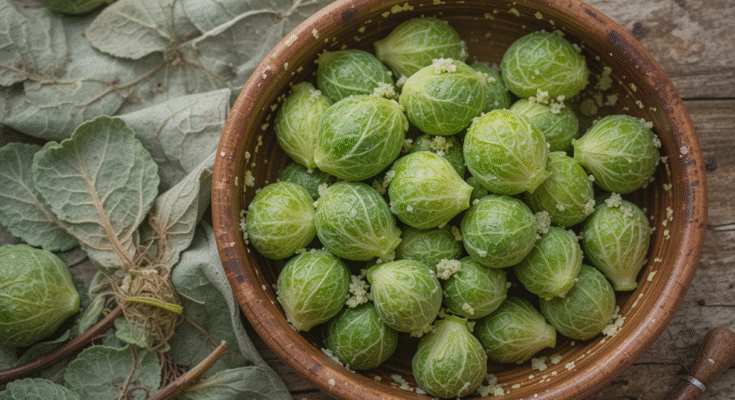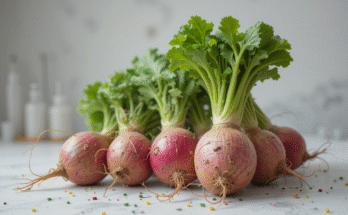🥦 Brussels Sprouts: The Mini Powerhouses of Health
Brussels sprouts may be small in size, but they offer a big nutritional punch. Belonging to the cruciferous vegetable family (alongside broccoli, kale, and cabbage), Brussels sprouts are known for their dense nutrient profile, cancer-fighting properties, and versatility in the kitchen.
✅ Detailed Health Benefits of Brussels Sprouts
1. 🧬 Rich in Antioxidants and Cancer-Fighting Compounds
-
Brussels sprouts are a leading source of glucosinolates, which convert to sulforaphane and indole-3-carbinol—compounds shown to:
-
Neutralize free radicals
-
Promote liver detoxification
-
Suppress growth of cancerous cells, especially in the colon, breast, and prostate
-
-
The kaempferol in Brussels sprouts may reduce the risk of chronic inflammation, heart disease, and even cognitive decline.
2. 🦴 High in Vitamin K for Bone and Blood Health
-
Just one cup of cooked Brussels sprouts provides over 190% of the daily value for vitamin K1.
-
This vitamin plays a key role in blood clotting and is essential for:
-
Calcium absorption
-
Bone mineralization
-
Preventing osteoporosis and fractures as we age
-
3. 🛡️ Immune System Booster
-
With over 100% of the daily vitamin C in just one serving, Brussels sprouts are powerful for:
-
Strengthening immune response
-
Supporting wound healing
-
Promoting collagen production for skin, joints, and connective tissue
-
4. ❤️ Heart Health Support
-
The fiber, antioxidants, and anti-inflammatory phytonutrients help:
-
Lower LDL (bad cholesterol)
-
Improve vascular function
-
Reduce arterial inflammation
-
-
Contains potassium, which helps maintain healthy blood pressure
5. 🍽️ Supports Digestive Health
-
A single serving contains 4 grams of fiber, making it beneficial for:
-
Regular bowel movements
-
Preventing constipation
-
Feeding good gut bacteria (acts as a prebiotic)
-
-
Also contributes to appetite control and blood sugar regulation
6. 🧠 May Enhance Brain Health
-
Kaempferol and vitamin C protect the brain from oxidative damage
-
May reduce the risk of cognitive decline, including Alzheimer’s and Parkinson’s diseases
7. 💉 Supports Blood Sugar and Insulin Balance
-
Brussels sprouts contain compounds that improve insulin sensitivity
-
The fiber content slows digestion and absorption of sugars, helping maintain stable blood sugar levels
🥗 Nutritional Snapshot (Per 1 Cup Cooked Brussels Sprouts)
| Nutrient | Amount |
|---|---|
| Calories | ~56 kcal |
| Fiber | ~4 g |
| Vitamin K | ~195% DV |
| Vitamin C | ~125% DV |
| Folate | ~15% DV |
| Potassium | ~14% DV |
| Antioxidants | Kaempferol, Sulforaphane |
DV = Daily Value based on a 2,000-calorie diet
🍽️ Delicious Ways to Enjoy Brussels Sprouts
-
Roasted with garlic and olive oil – for a crispy, caramelized bite
-
Sautéed with balsamic vinegar – enhances natural sweetness
-
Shaved raw into salads – adds crunch and nutrition
-
Air-fried or grilled – a perfect, healthy side
-
With bacon, nuts, or pomegranate seeds – to balance flavors and boost nutrients
💡 Fun Fact
Brussels sprouts become sweeter after the first frost—cold weather helps reduce their natural bitterness, which is why they’re often harvested in late fall and winter.



